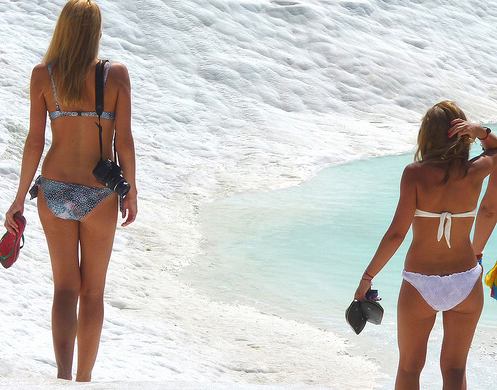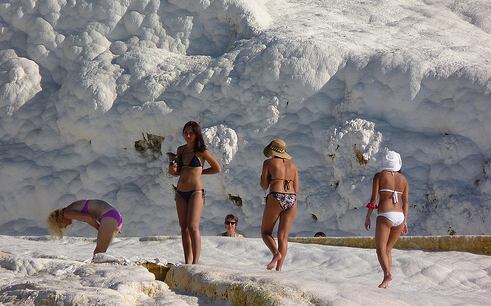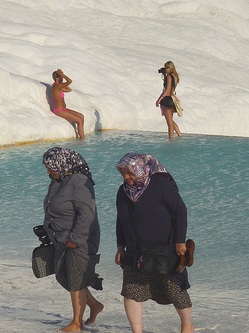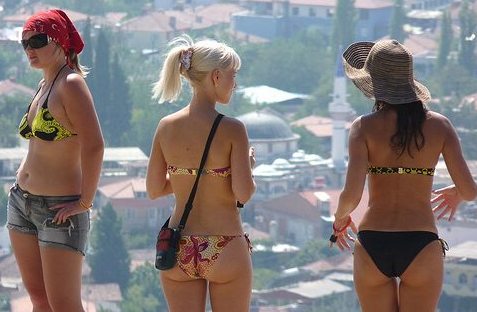in force the trojan horse
BIKINI JIHAD IN PAMUKKALE (TURKEY)

by
ROBERT J. LEWIS
___________________________________
We all meet our destiny
on the road we take to avoid it.
Jung
Pamukkale, which translates into cotton castle, is one of the natural wonders of the world and is a recognized World Heritage Site. The extraordinarily beautiful and blinding salt and calcium cliff formations include exquisite terraces, basins and travertine pools formed over millions of years by saline water deposits.
It has become a favorite tourist attraction for especially eastern Europeans (Russians, Poles, Romanians, Bulgarians and former Yugoslavs). 
 They arrive by the busload, and at the lower entrance they remove their shoes (obligatory) and most of their clothing (not obligatory), and begin one of the most pleasurable and delightful ascents on the planet. The feet, enjoying the reassuring grip of the vermiculate-grooved, crusty (lapidified) surface, seem to float over even the steepest sections while warm thermal water washes over the body’s most neglected appendage. Along the way up are knee-deep turquoise pools into which the bikini clad submerge themselves and come out dripping wet and glistening in the hot sun. The leisurely and thoroughly sensual climb terminates in a modern, fully equipped spa where eco-friendly run off from the plateau has been converted into a collection of inter-connected pools shaded by palm tree, leaf and frond. And if all this weren’t enough, just behind the spa are the spectacular ruins and amphitheater of Hierapolis.
They arrive by the busload, and at the lower entrance they remove their shoes (obligatory) and most of their clothing (not obligatory), and begin one of the most pleasurable and delightful ascents on the planet. The feet, enjoying the reassuring grip of the vermiculate-grooved, crusty (lapidified) surface, seem to float over even the steepest sections while warm thermal water washes over the body’s most neglected appendage. Along the way up are knee-deep turquoise pools into which the bikini clad submerge themselves and come out dripping wet and glistening in the hot sun. The leisurely and thoroughly sensual climb terminates in a modern, fully equipped spa where eco-friendly run off from the plateau has been converted into a collection of inter-connected pools shaded by palm tree, leaf and frond. And if all this weren’t enough, just behind the spa are the spectacular ruins and amphitheater of Hierapolis.

For the first time ever in human history, fifty percent of all people live in cities, but especially for newcomers, city dwelling is not a first choice but a necessity, a means to making ends meet. This is no less true for Istanbulers and Ankarans.. Well aware that the urban environment does not answer to the basic human need to be in direct contact with nature, and that Pamukkale is superbly disposed to answer that need, the authorities, in the 1960s, decided to restore the site to its former pristine state by removing all the hotels and shops that were threatening to desecrate the area. With the water temperature at constant 33 Celsius (91 Fahrenheit), tourist revenue is a 365 day/year proposition no government can discount.
Despite the visionary reforms of Ataturk in 1923, the founder of the modern, secular Republic of Turkey, the country remains religious and its people, for the most part, are practicing Muslims. In the rural areas and small towns and villages, the Mosque still regulates life, and in the larger metropolitan areas, where handsome apartment blocks (that put ours to shame) ring the downtown core, the Mosque is almost always included as the centerpiece of any new development.

Compared to western women, Turkish women, even those who identify as secular in their world view, are modest in their dress. Traditional female dress consists of the tesettür, the head scarf that resembles the hijab; the toptan pardesü, similar to a light topcoat or kaftan cut off well below the knees, and the salvar, the airy balloon pant. When outside the home, even in temperatures that sometimes climb to 40 Celsius, the older generation keeps to traditional dress while most of the young, over jeans and high heels, continue to wear the head scarf.
However, when the Eastern Babe arrives on the shores of Pamukkale, she strips off her clothing down to a bikini, which might be a string,  and insouciantly takes to the slopes in gesture of
and insouciantly takes to the slopes in gesture of  appropriation that neither ineptitude nor asininity can account for as she tosses both modesty and respect for local custom to the warm winds. And when she rises, Venus-like, from one of the many travertine pools that follow the ascent, the onlookers, some of whom are traditionally dressed Muslim women, suddenely find themselves in the crosshairs of bikini bottoms clinging to every cleft and crevice, and swollen nipples and breasts pushing against the flimsiest material. There is no looking away because the Eastern Babe has taken over the site in what can only be described as the bikini equivalent of Jihad, a state of affairs that must leave a vacationing Muslim family, that might include a 14-year-old son and 12-year-old daughter, in a state of consternation and bewilderment. If the bikini count is a reliable indicator, the West has already won the clash of civilizations.
appropriation that neither ineptitude nor asininity can account for as she tosses both modesty and respect for local custom to the warm winds. And when she rises, Venus-like, from one of the many travertine pools that follow the ascent, the onlookers, some of whom are traditionally dressed Muslim women, suddenely find themselves in the crosshairs of bikini bottoms clinging to every cleft and crevice, and swollen nipples and breasts pushing against the flimsiest material. There is no looking away because the Eastern Babe has taken over the site in what can only be described as the bikini equivalent of Jihad, a state of affairs that must leave a vacationing Muslim family, that might include a 14-year-old son and 12-year-old daughter, in a state of consternation and bewilderment. If the bikini count is a reliable indicator, the West has already won the clash of civilizations.
The government apologists, for whom monetary policy is more worthy of attention than the directives that issue from the Mosque, argue that what is on display in Pamukkale isn’t even a talking point when compared to the topless and nudist beaches in Tunisia and Morocco, to name two popular Muslim beach fronts. You can always find another beach, they argue on the way to the bank.

 But unlike beaches, that number in the thousands, there is only one Pamukkale and Muslims, many of whom have come from far, are forced to share the same public space with hundreds of near naked women. You would think the Eastern Babe, a guest, would be more sensitive to the local culture and abide by house rules, but in point of fact she is too wrapped up in her own person and sensuality to even notice the host. From the moment she takes to the slopes, she knows she is being made love to by a 1001 cameras which she conveniently confuses for friendly advice and consent.
But unlike beaches, that number in the thousands, there is only one Pamukkale and Muslims, many of whom have come from far, are forced to share the same public space with hundreds of near naked women. You would think the Eastern Babe, a guest, would be more sensitive to the local culture and abide by house rules, but in point of fact she is too wrapped up in her own person and sensuality to even notice the host. From the moment she takes to the slopes, she knows she is being made love to by a 1001 cameras which she conveniently confuses for friendly advice and consent.
Despite her detached airs and sashay, it would be a mistake to compare the Eastern Babe to the self-reliant, genuinely liberated Western woman. Even as she strikes a pose and raises nonchalance to an art form, she is in almost every case an extension of the man who has her on tight leash. Her confidence, equipoise and self-indulgence is her man’s pleasure, just as her pleasure is to flatter his conquest and command. She comes to Pamukkale not to indulge the site but to make it a backdrop to her vanity, which is proxy for his vanity.

 What distinguishes the Eastern Babe from all other women is that she is able to transform the trophy that she is into a virtue. It’s a ruse that arouses both our curiosity and envy because we’re not sure it is a ruse, and if it isn’t, is it transferable?
What distinguishes the Eastern Babe from all other women is that she is able to transform the trophy that she is into a virtue. It’s a ruse that arouses both our curiosity and envy because we’re not sure it is a ruse, and if it isn’t, is it transferable?
In a clutch of tourists, without the least inhibition, she’ll stop, perch a slender arm on a cocked hip, take a deep breath and look into the camera as if she were the last female on the planet. The spectacle is so bold and defiant we wither before it in admiration, and are at a loss to explain what it is that allows her to affect such utter indifference to the commotion she has instigated. When in motion she is in perpetual motion, her lithe and lissome body curving, angling and bending to the voluptuously uneven lay of the undulating terrain. Whether in front or behind her, there is no averting the eyes because she is everywhere, offering glimpses of what our world will look like when cloning becomes de rigueur.
Perhaps a working girl or young mother at home, in Pamukkale she is both queen and goddess, an altar of sensuality around which men from all the world’s religions congregate to form a not so secret society of worshippers.

 In her art and innocence, the Eastern Babe has managed to undermine an entire way of life by revealing its incommensurability with the laws of nature. The temperatures are hotter than July, turquoise waters beckon at every level, the weather not only begs for the removal of all superfluous clothing but makes a strong case that refusal is tantamount to offending the natural order.
In her art and innocence, the Eastern Babe has managed to undermine an entire way of life by revealing its incommensurability with the laws of nature. The temperatures are hotter than July, turquoise waters beckon at every level, the weather not only begs for the removal of all superfluous clothing but makes a strong case that refusal is tantamount to offending the natural order.
Like long-legged deer paused in a stream, the Eastern Babe makes her case in silence.
If this were a mating ritual along the lines of the Italian La Passeggiata, the Muslim woman, wrapped up like a mummy, suffocating under the weight and wool of tradition, would become extinct.
After a day on the slopes of Pamukkale, one must wonder to what extent the Muslim has been irreparably destabilized by the exposure. In the days just prior to the destruction of the Twin Towers, the 9/11 bombers did not spend their remaining hours in the Mosque of their choice, but in strip joints, brothels and casinos; the Koran was no match against the consolations of the West.
If the Turkish authorities wanted to put an end to Bikini Jihad, they could do it on a lira. In Saudi Arabia, for example, fearing the effects of being exposed to western culture, guest workers and professionals from America and Europe are routinely sequestered in compounds where with impunity they can indulge in alcohol, topless sunbathing and their 47% divorce rate.
In 2012, for the occasion of the Hajj (annual pilgrimage), a thousand Nigerian women were sent back home packing because they weren’t accompanied by a male guardian. No such tough love in Pamukkale. The authorities know that a cheap flight with everything included is something the cash-strapped Eastern Babe cannot turn down, that outsourced bikinis and long legs are good for everyone’s bottom line.
During the past 25 years, in a concerted effort to gain entry to the EU, Turkey has transformed itself into a country that now looks and feels like Europe: its state-of-the-art autoroutes, new cities and urban design combine aesthetics and efficiency on a scale with which very few places on the planet can compete. But rapid growth and modernization have burdened Turkey with a huge national debt, on top of which it imports 90% of its oil, which means the country is hungry for foreign currency. For the average Muslim, for whom modesty is still an idea whose time has not yet gone, Bikini Jihad (invasion by invitation) is a stark reminder that the government’s first priority is to feed its coffers, which leaves Mustafa and his brothers caught between a thong and a hard place, between westernization and radicalization.
* * * * * * * * * * * * * *
On the slopes of Pamukkale, that nebulous zone between fantasy and reality, a victory flag, stitched together from abandoned bikinis, has already been hoisted, and the not so secret goal of the West to undermine Islam from within looks more and more inevitable with each arriving busload of tourists: Trojan Horse redux.
I can foresee the day when Pamukkale will open up the site to the night, and under the cover of darkness a Turkish Delight modeled after Las Vegas will rise in ascendency and transform the once pious Muslim way of being-in-the-world into its unholy opposite.
